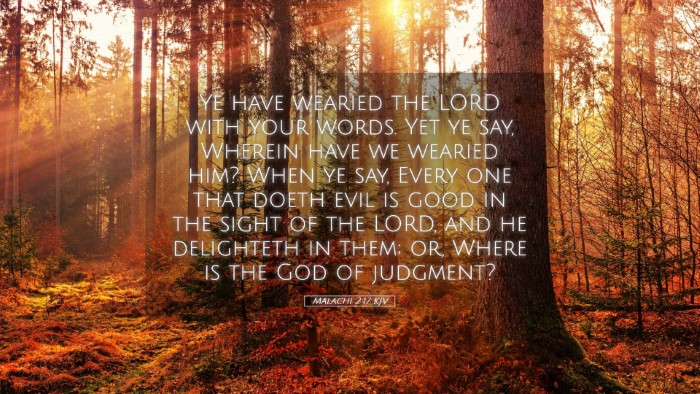Old Testament
Genesis Exodus Leviticus Numbers Deuteronomy Joshua Judges Ruth 1 Samuel 2 Samuel 1 Kings 2 Kings 1 Chronicles 2 Chronicles Ezra Nehemiah Esther Job Psalms Proverbs Ecclesiastes Song of Solomon Isaiah Jeremiah Lamentations Ezekiel Daniel Hosea Joel Amos Obadiah Jonah Micah Nahum Habakkuk Zephaniah Haggai Zechariah MalachiMalachi 2:17
Malachi 2:17 KJV
Ye have wearied the LORD with your words. Yet ye say, Wherein have we wearied him? When ye say, Every one that doeth evil is good in the sight of the LORD, and he delighteth in them; or, Where is the God of judgment?
Malachi 2:17 Bible Commentary
Commentary on Malachi 2:17
Malachi 2:17 states: "You have wearied the Lord with your words. Yet you say, 'How have we wearied him?' By saying, 'Everyone who does evil is good in the sight of the Lord, and he delights in them,' or by asking, 'Where is the God of justice?'"
Introduction
This verse captures a moment of profound spiritual apathy and misunderstanding among the people of Israel. In it, we find the prophet Malachi addressing the failure of the people to recognize the gravity of their words and actions regarding God’s nature, particularly concerning His justice and moral order. The prophets’ role was often to awaken the conscience of the people, guiding them back to a correct understanding of God.
The Context of Malachi
The Book of Malachi is the last of the Minor Prophets in the Old Testament. Written after the Babylonian exile, it is a crucial text that addresses the theological and moral decline of Israel following their return to Jerusalem. The people had become desensitized to sin and had begun to question God’s justice and His relationship with Israel.
God's Enduring Burden
Matthew Henry notes that God is wearied not by His own inability to deliver justice, but by the ungratefulness and obstinacy of His people. They had become comfortable in their sin, making excuses for their actions, and failing to see God’s standards. This wearying of God speaks to a relational disconnect, where the people’s words trivialized the divine character.
Misinterpretation of Divine Favor
Albert Barnes emphasizes the irony in the people's claim that those who commit evil are considered good in God's eyes. This reflects a deep misunderstanding of God's tolerance and patience. The people of Israel twisted God's nature to fit their desires, believing that just because God had not instantly punished them, His approval followed. This attitude can be seen as one of the longstanding issues of humanity—the desire to redefine good and evil based on personal and communal comfort rather than divine standard.
Theological Implications
At its core, Malachi 2:17 tackles the problem of theological misunderstanding that leads to moral decline. The key issues raised in this verse include:
- The Nature of God: The people incorrectly perceived God as one who delighted in their wrongdoing.
- Questioning Justice: Their challenge, "Where is the God of justice?" signifies a naive skepticism, perhaps expecting an immediate display of justice instead of recognizing the broader scope of God's plan.
- Spiritual Apathy: There is a significant danger when a community downplays the seriousness of sin, as it often results in spiritual apathy or outright rebellion against God.
Practical Applications for Today
Malachi 2:17 serves as a sobering reminder for contemporary believers, pastors, and theologians:
- The Importance of Discernment: In a culture that often blurs the lines of right and wrong, it is crucial for believers to seek discernment and adhere to biblical truth.
- Recognizing God’s Patience: The delay of divine judgment should not be mistaken as divine approval of sin. Paul speaks of God’s kindness leading to repentance (Romans 2:4).
- The Church's Voice on Justice: The church should actively seek justice and righteousness, speaking out against the moral compromises that pervade society.
Conclusion
In conclusion, Malachi 2:17 invites deep reflection on our words and attitudes toward God and His justice. As students of Scripture, pastors, and theologians, it is imperative to align our understanding with the revealed nature of God, ensuring that our proclamation reflects His holiness, justice, and love. Acknowledging the weight of our words—especially regarding divine matters—serves not only to strengthen our relationship with God but also to influence the world around us.


